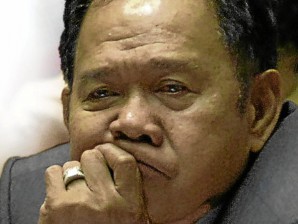
Ex-Comelec Commissioner Virgilio Garcillano denying charges at House hearing on Dec. 7, 2005, of rigging 2004 elections. INQUIRER PHOTO
On June 6, 2005, in an attempt to preempt the opposition, then Press Secretary Ignacio Bunye played to reporters two CDs of purported tapped conversations between then President Gloria Macapagal-Arroyo and then Election Commissioner Virgilio Garcillano.
In the so-called “Hello Garci” conversations that Bunye claimed were “doctored,” the voice of a woman, said to be Arroyo’s, could be heard asking the person on the other end of the line—believed to be Garcillano—to protect her purported lead of one million votes over her closest rival.
The next day, opposition lawyer Alan Paguia released his own two tapes of the conversations. He later said he got the tapes from former Sen. Francisco Tatad, who said these were mailed to him.
On June 10, 2005, former National Bureau of Investigation Deputy Director Samuel Ong claimed that he had “the mother of all tapes” that would implicate Arroyo. He said he got the material from Sgt. Vidal Doble, a friend of his at the Intelligence Service of the Armed Forces of the Philippines (Isafp).
The Isafp later denied it was engaged in wiretapping.
Doble also denied that Ong’s tapes had come from him. But he said that he appeared in a scripted videotaped “authentication” of the wiretaps after he and his family were threatened, and later received P2 million for the effort.
He said the money came from Laarni Enriquez, a mistress of former President Joseph Estrada. Enriquez later denied this.
Ong died of lung cancer in May 2009.
‘I am sorry’
On June 21, 2005, the House of Representatives opened inquiries into the wiretapping and played the tapes.
Six days later, in the face of mounting calls for her resignation, Arroyo admitted in a televised address that she had called an election officer because she was anxious to protect her votes.
“I am sorry,” she said. But she did not name the person on the other end of the line.
Garcillano ignored summonses to appear before a congressional hearing. Later, on Dec. 4, 2005, he turned himself in to authorities.
He denied that he had left the country and said he was in the homes of Muslim friends in Mindanao, reading and writing his memoirs. He admitted having talked with Arroyo several times in 2004 but claimed there was no mention of protecting votes. He declined to authenticate the tapes.
In January 2006, the House inquiry was concluded without a resolution of the issue—a failure blamed on Arroyo’s order in September 2005 barring officials from testifying in congressional hearings without her permission.
In its report in February 2006, the House said: “The question of authenticity can only be answered when the person or entity responsible for the alleged wiretaps admits to the act … or when the persons who engaged in the conversations admit to them, as the President may have done in her public apology on 27 June 2005.”
‘Feelers’
In July, amid efforts by the government to pursue electoral sabotage charges against Arroyo, Ronald Llamas, President Aquino’s adviser on political affairs, said Garcillano had sent feelers to Malacañang expressing his willingness to finally “tell all” against Arroyo.
But on July 30, in a press conference in Baungon, Bukidnon province, Garcillano denied being involved in cheating in the 2004 presidential election. He also denied having sent feelers to Malacañang and claimed it was the Aquino administration that sent emissaries to get him to talk.
Llamas stood by his previous statement, saying Garcillano just changed his tune after meeting with his handlers, which he identified as “[Zambales Gov. Hermogenes] Ebdane and [alleged ‘jueteng’ lord] Bong Pineda, probably.” Inquirer Research
Source: Inquirer Archives